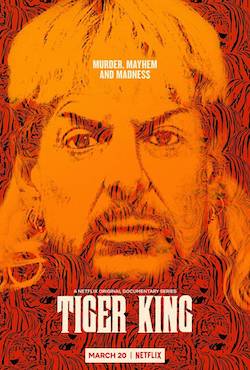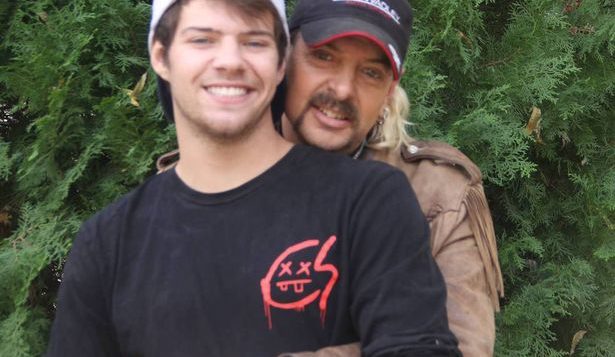
Tiger King
Directed by Eric Goode
and Rebecca Chaiklin
Netflix
THIS PAST APRIL, Chuck Todd, host of NBC’s Meet the Press, told his audience: “If you have been feeling intellectually superior for not watching Tiger King, well, there you go.” Todd was responding to Microsoft founder Bill Gates’ embarrassed admission that his daughter had coerced him into watching Netflix’ Tiger King, the can’t-look-away docu-series that became a cultural phenomenon while millions of Americans sheltered in place. The fact that Joe Exotic (born Joseph Maldonado-Passage in 1963) is openly gay is the least remarkable thing about him. What about the two-toned mullet? The ears so loaded down with piercings that they look like fishing tackle? Tiger King is this and more. The seven episodes, inspired by Exotic’s deranged antics inside a self-described “trashy, roadside zoo” in Wynnewood, Oklahoma, also includes a botched murder-for-hire scheme and various other brushes with death.
The San Diego Zoo, this is not: Bengal tigers are fed road kill and expired meat donated by the local Walmart; the gift shop features animal print undies and lubricants. The staff consists mainly of ex-cons and recovering addicts looking for a new start, while in the meantime inhabiting rat-infested trailer parks compliments of the boss. Exotic’s ex-husband, John Finlay, left nearly toothless due to an addiction to methamphetamines, sports a lower abdominal tattoo that reads: “Privately Owned Joe Exotic.” His owner, as the tattoo lays bare, is less a husband and more a nightmarish version of a cat lady. Regardless, Exotic and Finlay were together for eleven years, even living in a polygamous thruple with Exotic’s second husband Travis, until Finlay declared that he is, in fact, straight and subsequently flew the coop. Tragedy ensues: Travis, whom Exotic married at age nineteen, dies of a self-inflicted gunshot wound, unsurprisingly caught on camera. His death (intentional or not) supplies his widower with the chance to stage a kitschy funeral service, at which he takes center stage with a cheesy ballad, all the while wiping away crocodile tears. Since younger men are like catnip for the predatory Exotic, he erects a gaudy memorial for his late husband and quickly moves on to Dillon, the next boy toy to join what is part cult and part criminal enterprise.

With its alliterative subtitle, “Murder, Mayhem and Madness,” Tiger King is a true crime show that filmmakers Eric Goode and Rebecca Chailkin assembled out of footage stretching back five years. It’s Duck Dynasty meets Shittown (a must-hear of the early podcast era that also spotlights a redneck’s queer quirks and criminality). Exotic will do just about anything to preserve his brand—he’s also a country-music performer, a magician, a gubernatorial candidate, and an accused arsonist—which is where his arch-nemesis Carole Baskin enters the picture. Once Exotic took his three-ring circus on the road, performing with tiger cubs in American malls, he attracted the attention of animal activists, chiefly Baskin, who heads Big Cat Rescue. Three episodes into the series, the mood darkens considerably as the viewer is given a harrowing look into Exotic’s drug-fueled vitriol for Carole. Exotic is convinced that Baskin killed her husband, Don Lewis, and fed him to the big cats in her own animal sanctuary. And you thought your litter box needed a cleaning.
Accounting for the popularity of Tiger King is no simple task. Yes, the gun-toting Exotic takes a wrecking ball to the stereotype of the coastal (gay) elite with an impeccable sense of style, but Brokeback Mountain did that more than a decade ago. Yes, Exotic is a showman and proud vulgarian—“I am gay. I’ve had two boyfriends most of my life. I am broke as shit,” he announces during his bid for Oklahoma’s governorship—but he is also spectacularly cruel to the creatures that he pretends to love. Midway through the series, his malevolent misogyny bares its teeth. Buskin is not a real person to him but a “bitch down there in Florida” deserving of his vengeful fury. In some of the series’ most hellish moments, he not only burns Buskin in effigy but menaces a sex-doll made in her image with weaponry and venomous snakes. Exotic is currently serving a 22-year prison sentence for shooting five tigers, and the irony is by no means lost on him. “I’m in a cage,” he says by phone, “Do you know why animals die in cages? Their soul dies.” But what does Exotic know about the human soul? Earlier on, he confesses that he knew he was gay at thirteen and, rejected by his father, broke his back after driving his car off a bridge. His talents lie not in tugging on the audience’s heartstrings but in his unflagging power to razzle-dazzle the masses.
Watching Tiger King, I was reminded of some of the greatest feline poems in literary history: Blake’s “The Tyger” (a meditation on God and sublime creation) and Rilke’s “The Panther,” inspired by the poet’s visit to the Jardin des Plantes in Paris and the sight of a panther pacing in its cage. Wearied by its confines, the animal has lost all ability to imagine a world beyond the bars of its cage. “To him, there seem to be a thousand bars,” writes Rilke, “and back behind those thousand bars, no world.” Perhaps this is the secret of Tiger King’s success: its overlapping forms of captivity, of being caged in “a thousand bars.”
As a captive audience, we sat trapped in our living rooms, scrambling for something to keep our minds off the worse public health crisis in modern memory, and how it would impact our jobs, our families, and our personal livelihoods. Before us stood the sight of sublimely terrifying tigers and other wild animals, all subject to a half-mad megalomaniac straight out of the tacky world of reality TV. The success of the series is additional proof that we remain chained to a self-anointed “king” who will do anything and say anything so long as we don’t look away and change the channel. Sound familiar? Shortly before “Tiger King” debuted, Joe Exotic asked Donald Trump for a pardon. Our collective enthusiasm with “Tiger King,” which is also colored by political fatigue and desensitization, is proof of a much wider and deeper Stockholm syndrome. The President’s objective appears to be working: we now give the biggest monsters on earth the benefit of the doubt.
Colin Carman is an assistant professor of English at Colorado Mesa University and author of The Radical Ecology of the Shelleys. His current book project centers on Jane Austen and happiness.






